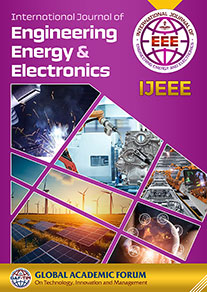
About the Journal
Introduction to IJEEE
In an era dominated by technological advancements in engineering, energy, and electronics, the integration of cutting-edge research into these fields is more crucial than ever. With this in mind, we are pleased to introduce the International Journal of Engineering Energy and Electronics (IJEEE), a peer-reviewed, open-access electronic journal published biannually by GAFTIM. (IJEEE) is committed to serving a global community of professionals, scholars, and researchers, offering a respected platform for disseminating pioneering knowledge in the fields of engineering, energy, and electronics.
IJEEE publishes peer-reviewed articles that employ a comprehensive and interdisciplinary approach, focusing primarily on the latest developments in engineering, sustainable energy solutions, and innovative electronic technologies. The journal explores a broad spectrum of topics, ranging from advanced engineering techniques and energy-efficient technologies to cutting-edge developments in electronic systems, ensuring its content is pertinent to current industry challenges and advancements.
The journal's gaol is to present the cutting edge of engineering, energy, and electronics research. Through its publications, (IJEEE) supports academic institutions, industry professionals, and researchers in informed decision-making, thereby fostering the continuous advancement of these crucial fields. We invite submissions from a variety of engineering, energy, and electronics disciplines, while ensuring that all articles adhere to IJEEE's rigorous publication standards.
Mission
The core mission of the International Journal of Engineering Energy and Electronics (IJEEE) is to advance and disseminate scholarly research articles that significantly contribute to the fields of engineering, energy, and electronics. In line with the best practices of leading journals in these domains, IJEEE aims to support professionals, institutions, and the broader scientific community by promoting the highest standards of innovation and development in these key areas. The journal is dedicated to bridging the gap between theoretical advancements and practical applications in engineering, energy, and electronics, thereby fostering the translation of cutting-edge research into real-world solutions and advancements.
Aim & Objectives
The International Journal of Engineering Energy and Electronics (IJEEE) is dedicated to disseminating knowledge and advancing understanding in the dynamic fields of engineering, energy, and electronics. Emulating the best practices of premier journals in these disciplines, (IJEEE) prioritizes the publication of empirical research while also valuing the integration of theoretical and conceptual insights.
Key Aims and Objectives:
- To provide a global platform for the latest research and developments in engineering, energy, and electronics, facilitating knowledge exchange among experts, scholars, and practitioners worldwide.
- To publish high-quality, peer-reviewed articles that exemplify the highest standards of research in these fields, contributing significantly to the academic and professional communities.
- To encourage interdisciplinary approaches and foster innovative methodologies in research, thereby addressing complex challenges and contributing to technological advancements.
- To facilitate the practical application of research findings, aiming to bridge the gap between theory and practice and drive real-world progress in engineering, energy, and electronics.
- To contribute to the ongoing discourse and development of these fields by featuring diverse perspectives and cutting-edge research, ensuring relevance and impact in a rapidly evolving global landscape.
Scope
The International Journal of Engineering Energy and Electronics (IJEEE) stands at the forefront of academic discourse, offering an expansive platform for cutting-edge research across engineering, energy, and electronics domains. The journal's scope encompasses a broad spectrum of topics, including but not limited to:
- Advanced Engineering Technologies: Covering all types of engineering, such as: mechanical, civil, electrical, and chemical engineering, with a focus on innovation and application.
- Energy Systems and Sustainability: Exploring renewable energy sources, energy efficiency, sustainable energy policies, and environmental impacts.
- Electronics and Communication: Delving into the latest developments in semiconductor technologies, digital communication, and electronic circuits.
- Computational Engineering and Simulation: Focusing on computer-aided design, modeling, and simulation techniques in engineering.
- Robotics and Automation: Investigating advancements in robotics, automation, and intelligent systems.
- Power Systems and Smart Grids: Exploring the design, operation, and optimization of power systems and smart grid technologies.
- Nanotechnology and Materials Science: Covering innovations in nanotechnology, materials engineering, and their applications in various engineering fields.
- Biomedical Engineering: Bridging the gap between engineering and medicine, focusing on healthcare technologies and bioengineering.
- Environmental Engineering: Addressing environmental challenges, waste management, and sustainable engineering practices.
- Software Engineering and Information Systems: Exploring software development methodologies, information systems, and their applications in engineering.
- Telecommunications and Network Engineering: Investigating advancements in telecommunication networks, wireless communication, and network security.
- Energy Policy and Economics: Analyzing the economic aspects and policy implications of energy production and consumption.
- Control Systems and Instrumentation: Focusing on control theory, automation, and instrumentation in engineering processes.
- Transportation Engineering: Exploring the design, construction, and maintenance of transportation systems.
- Emerging Technologies in Engineering and Electronics: Introducing novel technologies and their potential impact on the future of engineering and electronics.
(IJEEE) is committed to pioneering the exchange of knowledge and ideas that push the boundaries of engineering, energy, and electronics, serving as a vital resource for academics, professionals, and policymakers.
Readership of this Journal
The International Journal of Engineering Energy and Electronics (IJEEE) appeals to a wide-ranging readership, encompassing professionals across the engineering, energy, and electronics sectors. This includes:
- Engineering Academics and Researchers: Scholars and researchers in various engineering disciplines who are seeking the latest advancements and research findings.
- Energy Sector Professionals: Individuals working in the renewable and non-renewable energy sectors, including energy policy analysts, sustainability experts, and environmental scientists.
- Electronics and Communication Engineers: Professionals involved in electronics design, manufacturing, and implementation, as well as communication engineers focusing on emerging technologies.
- Industrial Practitioners: Engineers, project managers, and technologists applying engineering principles in various industries.
- Policy Makers and Regulators: Government officials and regulatory bodies interested in the implications of engineering and technology policies.
- Students and Educators: Undergraduate and postgraduate students, as well as faculty in engineering, energy, and electronics departments.
- Technology Enthusiasts and Innovators: Individuals keen on understanding the latest trends and innovations in engineering, energy, and electronics.
- Consultants and Business Leaders: Professionals advising on or making strategic decisions related to engineering and technology implementations.
- Investors and Entrepreneurs: Those looking to invest in or start ventures within the realms of engineering, energy, and electronics.
IJEEE serves as a critical resource for this diverse community, providing insights and updates that are integral to the advancement and application of engineering, energy, and electronics knowledge.
Current Issue











